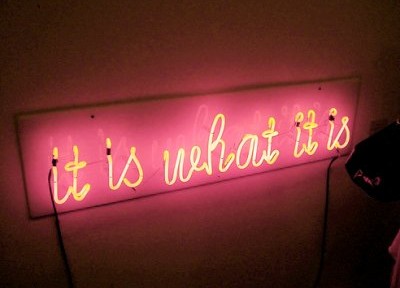It used to annoy me when people would say, “It is what it is,” and the phrase is gaining popularity. It always seemed like a cop-out in a conversation, a way to end it without actually having to think. Now, although I’m still not in love with the phrase, I’m a big fan of what it means and how it relates to something I’ve realized is of vital importance to our personal happiness: outcome independence.
Outcome independence is one of the most powerful mindsets we can adopt. It applies to everything. To be outcome independent is to know 100% that whatever the end result of a certain chain of events is, we’ll be totally fine and happy, even if the outcome is not the one we had hoped for. Of course we all hope/pray/lust for certain outcomes, and that’s fine and dandy, but tying our future happiness to a specific outcome is not only unhealthy, but also counterproductive.
Unhealthy because it causes stress and worry, and stress literally makes us less physically healthy. It also means our present and future happiness are dependent on something which may be completely out of our control. Counterproductive because stressing and worrying will hamper our present ability to function at our highest level to produce the outcome we hope for.
It sounds simple enough, but it’s not easy to achieve this mindset. I hope to convince you to make a conscious effort to adopt outcome independence as your default state of mind with regard to every event in your life.
Outcomes We Cannot Control
It seems crazy when you think about it, but it’s normal and commonplace. We do it all the time: worry about things which are completely out of our control. It seems crazy because what exactly is the point in worrying about a certain outcome when we literally have no way of controlling it? It’s pointless, and the stress and worry are completely unnecessary. This is the main reason I don’t follow the news.
For example, you want good weather on your wedding day. For the week leading up to it you’re obsessed with the forecast, when all of a sudden, two days before, the forecast says it’s gonna be pouring rain with lightning and thunder. You’re stressed. You’re worried the wedding will be a disaster, people won’t have fun, it’ll be ugly out. All of this stems from the weather, and as of May 31st, 2013, we can’t control the weather.
(On this line I hope to add a future edit which says, “Update: as you have probably heard, we can now control the weather.“)
Instead of worrying about the weather at all, release all dependence on the outcome. You’re getting married to (presumably) the love of your life regardless, your friends and family are going regardless, no one will blame you for the weather no matter how bad it is, and people will have fun regardless. Would it be a bit of a hassle if it pours rain? Of course. But since you have no control over it, there’s absolutely no reason to worry about it. Instead, adopt the mindset of, “Well, hopefully it’ll be nice weather, but if not, it’ll still be a great time,” or “Que sera, sera (What will be, will be),” or… “It is what it is.”
A few weekends ago I got a group of friends together (10 human friends 6 dog friends) for a nice, long hike. The weather forecast I saw said it would be partly sunny. My friend’s forecast said it would be rainy. Regardless, we went. It rained…and it rained…and it never stopped the whole time. We were all so moist. On the drive when it started to rain, instead of worrying about the possible bad weather, which I would have done 6 months ago, I had the mindset of, “Well if it rains it’ll still be a good time. It’ll be a good experience.” And it was. Not often do people do a six mile hike to the top of a mountain in the rain, in the cold, only to be “rewarded” with a view like this:
We couldn’t see thirty feet in front of us when we finally reached the summit. We were literally inside of a cloud and it was was moving at around 20 mph (i.e. it was cold). In spite of it all, everyone had a great time, and it’s definitely a hike we’ll remember forever. It was a great experience, and the forest was beautiful in a way we don’t usually get to see. The pitter-patter of raindrops on the thousands of leaves in the forest is an unbelievably calming sound.
The point is that we experienced the worst-case scenario, weather-wise, but still had an awesome time. Often when we worry about a certain outcome, that exact outcome isn’t even nearly as bad as we imagined it would be. And even if it is, what’s the use in worrying about it? Much better to think, “It would be awesome if it were sunny and it didn’t rain, but even if it rains, it’ll be fun,” or something like that. That way you avoid all of the stress and worry leading up to the event, thereby enjoying a larger portion of your day.
Some other outcomes we worry about which we can’t control are our mortality, trip delays (plane/car/bus/etc), whether or not we’ll be able to have kids, and certain physical ailments. Don’t stress about any of these things. It’s pointless.
Outcomes We Can Control
Although there is no outcome in this world over which we have complete control, which is one of the characteristics of life that make it so exciting, we do have at least some degree of control over most outcomes.
Even when we do have some control, it’s best to remain outcome independent. That doesn’t mean we shouldn’t set goals and do our best to achieve them. And it doesn’t mean we should stop caring about the outcomes in our lives. It simply means we need to separate our happiness from the outcomes of different situations and really ingrain it in our minds that we can and will be happy and fine regardless of how something turns out.
You might wonder how we can be outcome independent and still really, really want something and work hard to that end. The answer is that we can work our asses off to achieve our goals, yet all along we believe, we know, that whatever happens, we’ll still be happy, and we will have done everything in our power to achieve our goals. It’s all about how we think about things. Our Mind Is the Limit.
You might wonder if outcome independence will make us less likely to achieve our goals. The answer, ironically, is that being outcome independent with respect to our goals will actually make them more likely to be achieved, and in a less stressful, less painful manner.
For example, I really, really want to make a ten-foot putt on the 18th hole to win the tournament I’ve been competing in for the past four days. It all comes down to this one putt.
Incorrect mindset: “Oh man I really, really need to make this putt. I have no choice. I better make it. I better not miss it.”
Correct mindset: “I’m gonna do everything I can to make this putt, put every ounce of energy into making this putt. I hope it goes in, but it may not go in due to forces out of my control. If it doesn’t go in, it’s not that big of a deal, even though I really want to make it.”
The person who thinks about this incorrectly is more likely to be pissed off, sad, etc. if he misses the putt. He could hit a perfect putt and still not make it, but he’ll blame himself and be in a bad mood if he misses it. The person who thinks about this correctly is more likely to be outcome independent, so if he misses, although he’ll be disappointed, he won’t necessarily be in a crappy mood after missing it. Not only that, but the one who thinks about the putt correctly will be less nervous, less stressed, and he’ll be more likely to put a good stroke on the ball and make the putt. Of course this is just one example and it doesn’t really matter what you say in your head before hitting the putt as long as your mindset is one of outcome independence.
And as I said previously, although we do have a degree of control over whether or not the putt goes in, we don’t have full control. We could hit 20 identical putts in a row with a putting machine and not all of them will go in due to wind gusts, bumps on the green, or any number of other variables.
Another example is relationships. Nothing in our lives involving other people will really be under our control. With relationships I see it all the time. One partner or the other will constantly worry about the relationship and if it will end, or whether or not the person he/she is dating wants to enter a relationship. Their happiness is dependent on the outcome of the relationship. No bueno.
Ideally, you’re completely happy as a single person before you even enter a relationship. That makes it easier if/when a relationship ends because you don’t tie your happiness to your partner. However, many people think that they need to be in a relationship to be happy, and they often end up settling with the first person to come along who is also looking for a relationship. Regardless of how a relationship starts, the best mindset, contrary to the Disney Fantasy Fairy Tale Relationship™ that’s been pounded into our heads our whole lives, is one of outcome independence.
That doesn’t mean you don’t care about the relationship or your partner, or the possibility of a relationship with someone new. It just means you accept the fact that it’s not in your control, and whether or not the relationship happens or lasts, you’ll be just fine and dandy. All you can do is be yourself and treat him/her well, but beyond that, it’s ultimately up to your partner if he/she wants to enter into or end the relationship, of course assuming you want to enter or maintain the relationship.
The surprising result of an outcome-independent mindset with regard to relationships is that it makes you a more appealing prospect. Neediness is a turn-off to almost everyone. If a person likes you and you have the take-it-or-leave-it attitude before a relationship happens, he/she will be more likely to want to enter into a relationship because you are more confident and content with yourself due to your outcome independence.
If you’re already in the relationship and your partner knows you’re happy with or without him/her, it will make your partner love and respect you more as a person. A happy, confident person. He/she will also be more likely to work hard to keep you happy because he/she knows that if you’re not happy in the relationship, you will be able to end it since your happiness is not tied inextricably to it.
This is just another example of how outcome independence is such an important mindset to have with regard to everything in life.
The One Thing You Can Control
I said before nothing involving other people will ever be fully in your control. In truth, nothing at all is actually in your control except for one thing: how you react to situations. That includes both your emotional response and your physical response (actions).
Most if not the vast majority of people are not fully in control of their emotions. It’s not easy, but it’s not impossible. Personally, I’m not nearly there, although I’m improving every day. It’s tough, sometimes seemingly impossible, not to have a reflexive emotional response to certain stimuli.
For example, if someone cuts you off in traffic, your immediate emotional response is probably anger. Your physical response, what you do in response to the stimulus, could be any number of things. You could flick the guy off and scream “FUCK YOU ASSHOLE!” and be pissed off for hours. You could just mutter, “What a freakin idiot,” and get over it in minutes. Or ideally, you could simply write off the experience and remain unaffected by it, other than to be thankful you weren’t involved in an accident.
The best way to control your physical response is to learn to control your emotional response. However, controlling your immediate emotional responses in life is very difficult to do and it takes a conscious effort and practice. It’s probably easiest to learn to control your emotional response by accepting whatever emotions you experience in response to certain stimuli, and consciously controlling your physical responses. After a while, that conscious effort will become unconscious, so you will have successfully altered your emotional responses to your liking.
Related snippet: the other day, leaving work, I got onto the highway only to notice it was jam-packed with bumper-to-bumper traffic. Instead of becoming frustrated and annoyed, my immediate response was to think, “Wow, I’m lucky I work 7-4 instead of 8-5 so I don’t have to deal with this shit every day.” When I realized how different that response was from what it would have been just a few months prior, I laughed out loud. Having control over your emotional responses is a better way to live, for sure. I’ll write a post on controlling your emotions in the future (Update: Click here for that post). Feel free to subscribe below and keep an eye out for it.
This all ties back to having an outcome-independent mindset. If the only thing we can control is our reactions to situations, that means in reality, there’s not that much we can control. Which means with most things in life, having our happiness dependent on a specific outcome is silly at best, destructive at worst.
Final Thoughts
The first step to achieving an outcome-independent attitude is to be aware of our thoughts and emotions. When we’re stressing about something, we need to step back and realize we’re stressed. Once we realize we’re stressed, it means we’re worrying about a certain outcome. When we remember the outcome is not really in our control, it’s easier to release the stress.
“Whatever happens, happens.”
“It is what it is.”
We can further realize that even if the outcome is the worst-case scenario, most of the time if we reflect on a particularly undesirable outcome in the past, we can still glean from it many positives. Poor outcomes in the present very often turn out to be blessings in disguise. I’m sure you can think of a few examples in your own life. We don’t know whether or not any particular outcome will be good or bad for us in the long run, which lends even more credence to the outcome-independent mindset.
A friend of mine has a great saying he often uses: “Nothing ever goes wrong in my life.” That means everything in his past, good or bad, has led him to the present moment in his life, and he wouldn’t have it any other way. Thanks, Doc.
Yet another beautiful result of outcome independence is that people will like you more. You’ll be more confident, happier, less stressed, more easygoing. All desireable traits which will making you a better person overall.
So next time you’re stressed about something in your life, step back, realize it’s out of your control, and say, “It is what it is.”
But don’t say that shit to me 😉



Comments
11 responses to “It Is What It Is: The Outcome-Independent Mindset”
You are wise far beyond your years
thank you
jeff
Thanks Jeff, hope you’re well!
Great work bud! I am subscribing and will be checking in regularly. I’ve told you before, I thank you and you alone for the changes I’m making in my life and I love you for it! See ya on down the road. Be well.
I appreciate it, but that’s all you man. Keep pluggin’
[…] any more than a single crab on a little pubic hair of the body that is the universe. It sucks, but it is what it is. So often we want to know everything, especially about our lives and the lives of those close to […]
[…] one girl some day and spend the rest of my life with her and have kids. And if I don’t, well, que será, será. But there isn’t a single legitimate reason to make it legal. Yes there are financial […]
[…] For this trip, although it’s impossible not to have expectations, I will do my best to realize that whatever expectations I have will probably not be met. I do know that whatever happens specifically, it will be a great time. But I will not tie my future happiness to any set idea of how the trip will go. This is closely related to the outcome-independent mindset, which I wrote about here. […]
Have been checking some of your posts since yesterday and I gotta say I really like the way you write. It is inspiring and brings a smile to my face. I´ll surely be coming back to check more posts!
Thanks for the kind words Paola 🙂
[…] true. Ever since writing about gratitude here, living in the present here, outcome independence here, and eating slowly here, for example, I’ve found it much easier to apply that wisdom in my […]
[…] things that help me reduce or eliminate stress are meditation, an outcome-independent mindset, and keeping everything in perspective. Maybe those will work for you, maybe they won’t. […]